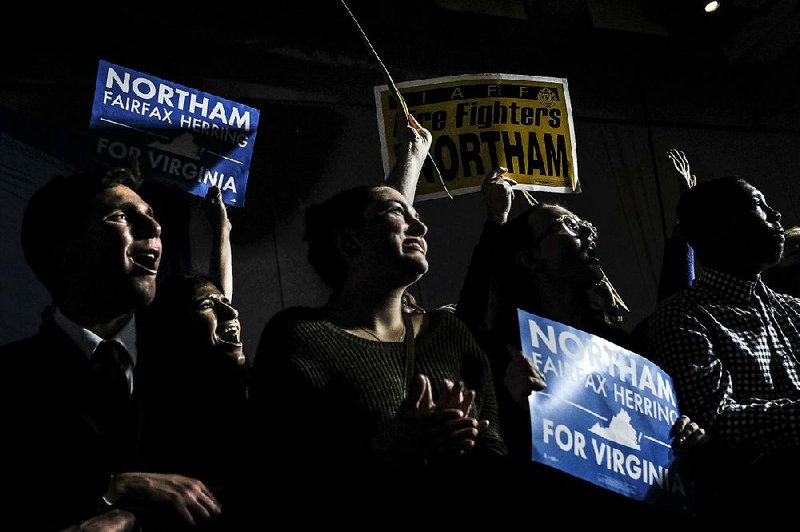RICHMOND, Va. -- In the tax-wary suburbs of New York City, high-tech neighborhoods outside Seattle and the sprawling, polyglot developments of Fairfax and Prince William County, Va., voters shunned Republicans up and down the ballot in off-year elections.
Leaders in both parties said the elections amounted to an earsplitting alarm bell for Republicans ahead of the 2018 elections, when the party's grip on the House of Representatives may hinge on the socially moderate, multiethnic communities surrounding major cities.
"Voters are taking their anger out at the president, and the only way they can do that is by going after Republicans on the ballot," said Rep. Charlie Dent, R-Pa. "If this isn't a wake-up call, I don't know what is."
The Democrats' gains were deep and broad, signaling alienation from the Republican Party among the sort of upscale moderates who were once a pillar of their coalition.
Democrats not only swept Virginia's statewide races but neared a majority in the House of Delegates, a legislative chamber that was gerrymandered to make the Republican majority virtually unassailable. They seized county executive offices in Westchester and Nassau County, N.Y., and captured mayoral elections in St. Petersburg, Fla., and Manchester, N.H. -- all races that had appeared to favor Republicans only months ago.
In Washington state, Democrats won in a special election to take control of the state Senate, establishing Democratic dominance of government on the West Coast. Democrats took council seats in vote-rich Delaware County, in the Philadelphia suburbs, a perennial battleground for control of the House.
Even in the Deep South, Georgia Democrats captured two state House seats where they previously had not even fielded candidates while snatching a state Senate seat in Buckhead, Atlanta's toniest enclave.
"Republicans are being obliterated in the suburbs," said Chris Vance, a former chairman of the Washington State Republican Party. "I don't think the Republican Party has a future in any state like Washington or Virginia, or Oregon or California, or many other places, where the majority of the voters are from urban or suburban areas."
Vance placed the blame squarely on President Donald Trump. "Among college-educated suburbanites, he is a pariah."
In Washington, D.C., congressional Republicans braced for a new wave of retirements just a day after another pair of House members, Rep. Frank LoBiondo of New Jersey and Rep. Ted Poe of Texas, declared they would not seek re-election. Dent, channeling the exasperation of his colleagues, suggested an exodus might be imminent.
"Our guys know they're going to be running into a fierce storm," said Dent, a leader of his caucus' moderate wing who has already announced that he will not run again. "Do they really want to go through another year of this?"
Even in the White House, where Trump's first reaction was to savage Ed Gillespie, the party's defeated gubernatorial candidate in Virginia, two advisers acknowledged that Trump was likely to help drive Democratic turnout next year in much the same way his predecessor, Barack Obama, did for conservative voters during midterm elections.
Democrats were as buoyant as Republicans were dejected. Party leaders gleefully predicted that the Senate, where the Republicans hold a two-seat majority, might now be in play and said their fundraising and candidate recruitment would take off going into the new year.
"We'll get a lot of candidates who are going to want to run, and I think for donors who have been on the sidelines, dispirited for the last year, I'm telling you people are jazzed up," said Gov. Terry McAuliffe of Virginia, the former national Democratic Party chairman.
Democrats won Tuesday with a historically diverse slate of candidates. Having long struggled to get diversity in the leadership tier of their party, they elected the first transgender legislator in the nation, the first Vietnamese-American legislator in Virginia, the first black female mayor of Charlotte, N.C., and the first black statewide officer in Virginia in more than a quarter-century.
Kathy Tran, who was elected to the House of Delegates in a Fairfax-based seat that Republicans previously held, said voters in her district had mobilized to rebuke Trump and his brand of politics. She urged national Democrats to follow Virginia's example by recruiting candidates from a range of backgrounds for the midterm campaign.
"This was a clear rejection of racism and bigotry and hateful violence," Tran said of the elections, adding, "People are hungry for a government that reflects the diversity of our communities."
Robert McDonnell, the former governor of Virginia and the last Republican to win a major election in the state, acknowledged on election night that the electorate there had soured on his party. The state, he said, had been swamped by "anger and malaise and vitriol" emanating from federal politics, and Democrats benefited from the electric energy of their base.
"The enthusiastic left showed up tonight in big numbers," McDonnell said, "and that really determined the outcome."
A Section on 11/09/2017

